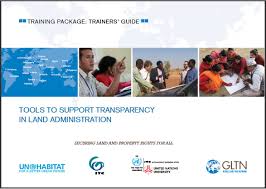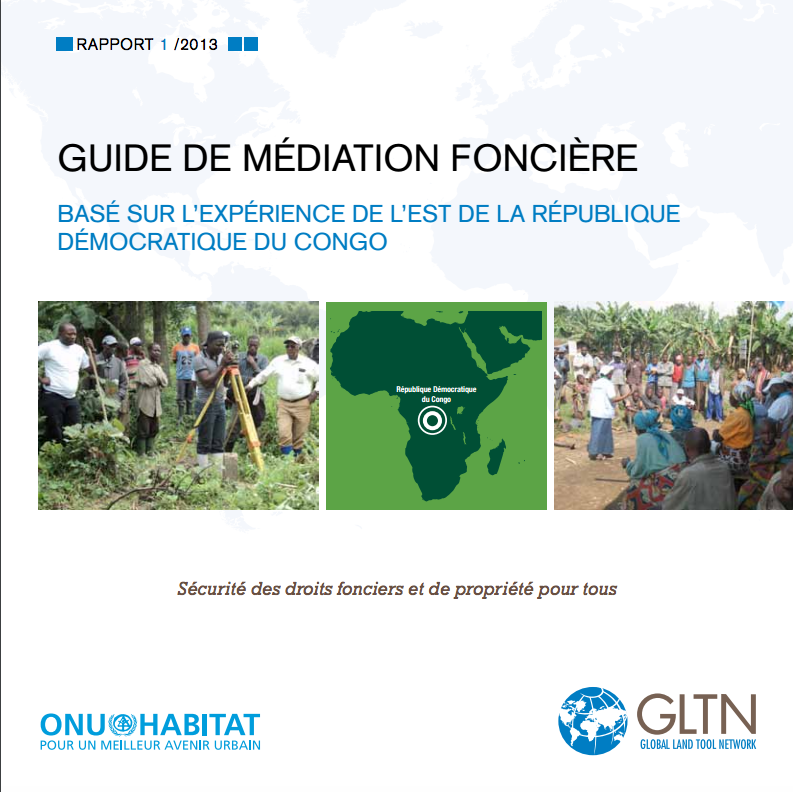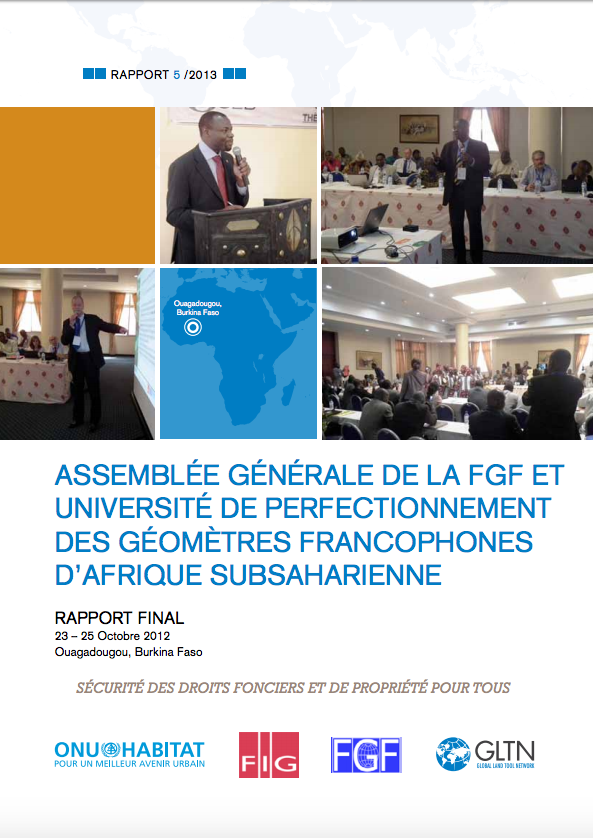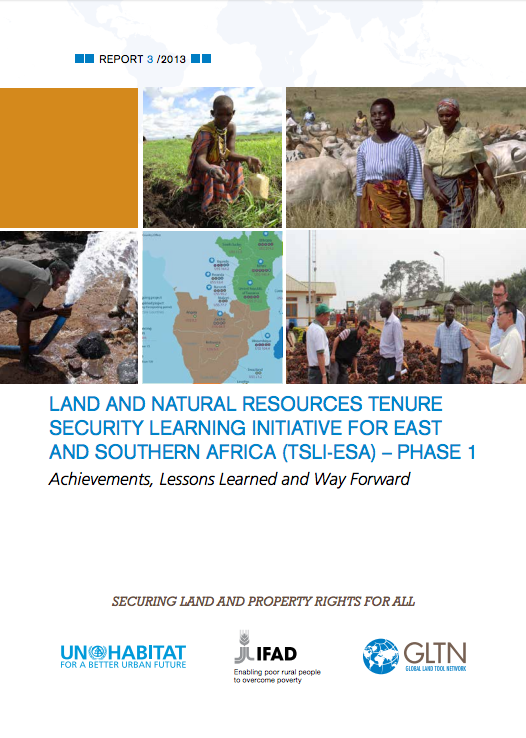Focal point
Location
The Global Land Tool Network (GLTN) is an alliance of global regional and national partners contributing to poverty alleviation through land reform, improved land management and security of tenure particularly through the development and dissemination of pro-poor and gender-sensitive land tools.
Secure land tenure and property rights are fundamental to shelter and livelihoods as well as the realisation of human rights, poverty reduction,economic prosperity and sustainable development.
The Global Land Tool Network (GLTN) main objective therefore is to contribute to poverty alleviation and the Millennium Development Goals through land reform, improved land management and security of tenure.
UN-Habitat through GLTN continues to work towards this with partners who include international civil society organizations, international finance institutions, international research and training institutions, donors and professional bodies.
Most developing countries use conventional land administration systems which cover less than 30 per cent of the country, leaving up to 70 per cent of citizens looking to informal and/ or customary approaches for their tenure security.
While there are many examples of good land policies, there are few policies that have been fully implemented due to lack of pro-poor, gendersensitive and largescale land tools. Further, conventional land titling approaches have largely failed to deliver their expected results since existing technical solutions are too expensive, inappropriate for the range of tenure found in developing countries, unsustainable financially or in terms of available capacity, and instead a range of land tenure options is more appropriate.
Core Values
Consequently, GLTN's core values and principles are founded in the development of land tools that are:
- Pro poor;
- Equitable;
- Sustainable;
- Affordable;
- Systematically large scale /scalable; and,
- Gender-sensitive, while taking into consideration:
- Good governance;
- Subsidiarity; and,
- The Continuum of Land Rights.
GLTN Objectives and Mandate
GLTN has developed a global partnership on land issues pulling together global partners, as well as many individual members. These partners include international networks of civil society, International Finance Institutions, international research and training institutions, donors and professional bodies. It continues to take a more holistic approach to land issues by working towards the following objectives:
- The establishment of a continuum of land rights, rather than just focus on individual land titling
- Improving and developing pro-poor land management, as well as land tenure tools
- Unblocking existing initiatives Assisting in strengthening existing land networks
- Supporting in the development of gendered land tools which are affordable and useful to grassroots
- Improving the general dissemination of knowledge about how to improve security of tenure
- Improving the general knowledge dissemination on the improvement of security of tenure
Resources
Displaying 221 - 225 of 286Tools to Support Transparency in Land Administration: Trainer's Guide
This trainer's guide is complementary to this training toolkit. It is part of an approach that aims to sensitize government agents about land administration, develop their capacity to address issues of corruption and to enhance transparency in the land sector. It focuses specifically on land administration with a view to filling the capacity development gap in the land administration sector. Training content covers key themes clustered into different training sessions related to land governance, transparency, land administration and tools that could help bring about transparency.
Guide de médiation foncière: Basé sur l’Expérience de l’Est de la République Démocratique du Congo
Le Guide de mediation fonciere s'inspire surtout de l'experience pratique de terrain du programme foncier tel que mene par ONU-Habitat a l'Est de la Republique Democratique du Congo, notamment au Nord Kivu, Ituri et Sud Kivu. Il se refere par endroit aux experiences d'autres pays en situation de post-conflits. Ce guide propose des etapes concretes et des outils utilises lors du processus de mediation fonciere. Le role et responsabilites des acteurs et ‘beneficiaires' de la mediation sont aussi decrits. Les principes et fondements d'une bonne mediation sont mis en exergue.
Assemblée Générale de la FGF et Université de perfectionnementdes Géomètres Francophones d’Afrique Subsaharienne (Ouagadougou Report)
En marge de l’Assemblée Générale de la Fédération des Géomètres Francophones (FGF), ONU-Habitat et le Réseau Mondial des Instruments Fonciers (GLTN), a organisé une séance de formation sur la bonne gouvernance foncière.
Cette rencontre technique et scientifique a réuni 130 experts géomètres, du secteur privé, du secteur public, enseignants, étudiants, venus de 13 pays d’Afrique Subsaharienne et d’Europe.
Land and Natural Resources Tenure Security Learning Initiative for East and Southern Africa (TSLI-ESA) - Phase 1
This report provides an overview of the achievements and learning from the Phase 1 of the Tenure Security Learning Initiative - East & Southern Africa (TSLI-ESA) Project. It also looks ahead to strategies for scaling up the initiatives, and to the second phase of the TSLI-ESA project. The main objective of the TSLI-ESA Phase 1 Project has been to identify common land and natural resources tenure issues and to enhance lesson sharing and knowledge management on land-related tools and approaches amongst the various projects, country stakeholders and partners.
Guide to Land Mediation: Based on the experience in the Eastern Democratic Republic of the Congo
The Guide to Land Mediation mainly draws its inspiration from practical experience on the ground of the land program conducted by UN-Habitat in eastern Democratic Republic of the Congo, especially in North Kivu, South Kivu and Ituri. It refers, in some places, to other countries experiences in post-conflict situations. This guide offers practical steps and tools used during the land mediation process. The publication highlights, not only the role and responsibilities of mediation stakeholders and 'beneficiaries', but also principles and foundations of a good mediation









